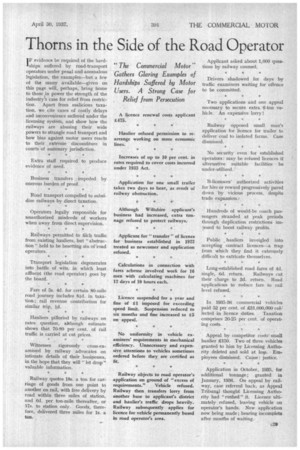Thorns in the Side of the Road Operator
Page 83

If you've noticed an error in this article please click here to report it so we can fix it.
"The Commercial Motor Gathers Glaring Examples of Hardships Suffered by Motor Users. A Strong Case for Relief from Persecution
I F evidence be required of the hardships suffered by road-transport operators under penal and anomalous legislation, the examples—but a few of the many available—giVen on this page will, perhaps, bring home to those power the strength of the industry's case for relief from restriction. Apart from malicious taxation, we cite cases of costly delays and inconvenience suffered under the licensing system, and show how the railways are abusing their wide powers to strangle road transport and how bias against motor users reacts to their extreme discomfiture in courts of summary jurisdiction.
Extra staff required to produce evidence of need.
Business transfers impeded by onerous burden of proof.
Road transport compelled to subsidize railways by direct taxation.
Operators legally responsible for unauthorized misdeeds of workers when away from direct supervision.
Railways permitted to filch traffic from existing hauliers, but " abstraction " held to be besetting sin of road operators.
Transport legislation degenerates into battle of wits, in which least affluent (the road operator) goes by the board.
Fare of 5s. 4d. for certain 80-mile road journey includes 81d. in taxation; rail revenue contribution for similar trip, id.
Hauliers pilloried by railways on rates question, although estimate shows that 70-80 per cent, of rail traffic is carried at cut prices.
Witnesses rigorously cross-examined by railway advocates on intimate details of their businesses, in the hope that they will "let drop" valuable information.
Railway quotes 18s. a ton for carriage of goods from one point to another on rail, with free delivery by road within three miles of station, and 6d. per ton-mile thereafter, or 17s. to station only. Goods, therefore, delivered three miles for Is. a ton. A licence renewal costs applicant £475
Haulier refused permission to rearrange working on more economic lines.
Increases of up to 10 per cent, in rates required to cover costs incurred under 1933 Act.
Application for one small trailer takes two days to hear, as result of railway obstruction.
Although Wiltshire applicant's business had increased, extra tonnage refused to protect railways.
Applicant for " transfer " of licence for business established in 1922 treated as newcomer and application refused.
Calculations in connection with fares scheme involved work for 16 men with calculating machines for 12 days of 10 hours each.
Licence suspended for a year and fine of Li imposed for exceeding speed limit. Suspension reduced to six months and fine increased to £5 on appeal.
No uniformity in vehicle examiners' requirements in mechanical efficiency. Unnecessary and expel'. sive attentions to vehicles sometimes ordered before they are certified as fit.
Railway objects to road operator's application on ground of "excess of requirements." Vehicle refused. Railway then transfers lorry from another base to applicant's district and haulier's traffic drops heavily. Railway subsequently applies for licence for vehicle permanently based in road operator's area. Applicant asked about 1,000 questions by railway counsel.
Drivers shadowed for days by traffic examiners waiting for offence to be committed.
Two applications and one appeal necessary to secure extra. 6-ton vehicle. An expensive lorry !
Railway opposed small man's application for licence for trailer to deliver coal to isolated farms. Case dismissed.
No security even for established operators: may be refused licences if alternative suitable facilities be under-utilized.
B-licensees' authorized activities for hire or reward progressively pared down by vicious process, despite trade expansion.'
Hundreds of would-be coach passengers stranded at peak periods through duplication restrictions im?osed to boost railway profits.
Public hauliers inveigled into accepting contract licences—a trap from which they find it extremely difficult to extricate themselves.
Long-established road fares of 4d.
single, lid, return. Railways cut their charge to 3d. return. Road applications to reduce fare to rail level refused.
In 1935-36 commercial vehicles paid 52 per cent. of 231,000,000 collected in licence duties. Taxation comprises 20-25 per cent. of operating costs.
Appeal by competitor costs' small haulier £150. Two of three vehicles granted to him by Licensing Authority deleted and sold at loss. Employees dismissed. Cause: justice.
Application in October, 1935, for additional tonnage ; granted in January, 1936. On appeal by railway, case referred back, as Appeal Tribunal thought Licensing Authority had "rushed" it. Licence ultimately refused, leaving vehicle' on operator's hands. New application now being made ; hearing incomplete after months of waiting.








































































































































































